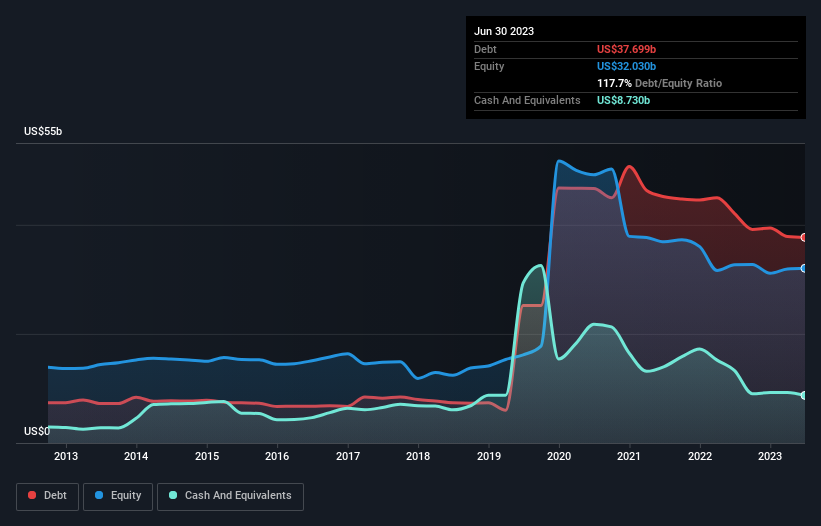- United States
- /
- Pharma
- /
- NYSE:BMY
Here's Why Bristol-Myers Squibb (NYSE:BMY) Can Manage Its Debt Responsibly

Warren Buffett famously said, 'Volatility is far from synonymous with risk.' When we think about how risky a company is, we always like to look at its use of debt, since debt overload can lead to ruin. We note that Bristol-Myers Squibb Company (NYSE:BMY) does have debt on its balance sheet. But the real question is whether this debt is making the company risky.
When Is Debt Dangerous?
Debt and other liabilities become risky for a business when it cannot easily fulfill those obligations, either with free cash flow or by raising capital at an attractive price. In the worst case scenario, a company can go bankrupt if it cannot pay its creditors. However, a more frequent (but still costly) occurrence is where a company must issue shares at bargain-basement prices, permanently diluting shareholders, just to shore up its balance sheet. Of course, the upside of debt is that it often represents cheap capital, especially when it replaces dilution in a company with the ability to reinvest at high rates of return. When we examine debt levels, we first consider both cash and debt levels, together.
See our latest analysis for Bristol-Myers Squibb
What Is Bristol-Myers Squibb's Net Debt?
You can click the graphic below for the historical numbers, but it shows that Bristol-Myers Squibb had US$37.7b of debt in June 2023, down from US$42.1b, one year before. However, it does have US$8.73b in cash offsetting this, leading to net debt of about US$29.0b.

How Healthy Is Bristol-Myers Squibb's Balance Sheet?
According to the last reported balance sheet, Bristol-Myers Squibb had liabilities of US$20.2b due within 12 months, and liabilities of US$41.3b due beyond 12 months. Offsetting these obligations, it had cash of US$8.73b as well as receivables valued at US$15.1b due within 12 months. So its liabilities total US$37.7b more than the combination of its cash and short-term receivables.
Bristol-Myers Squibb has a very large market capitalization of US$129.9b, so it could very likely raise cash to ameliorate its balance sheet, if the need arose. But it's clear that we should definitely closely examine whether it can manage its debt without dilution.
We use two main ratios to inform us about debt levels relative to earnings. The first is net debt divided by earnings before interest, tax, depreciation, and amortization (EBITDA), while the second is how many times its earnings before interest and tax (EBIT) covers its interest expense (or its interest cover, for short). This way, we consider both the absolute quantum of the debt, as well as the interest rates paid on it.
Bristol-Myers Squibb's net debt to EBITDA ratio of about 1.5 suggests only moderate use of debt. And its commanding EBIT of 11.7 times its interest expense, implies the debt load is as light as a peacock feather. On the other hand, Bristol-Myers Squibb's EBIT dived 19%, over the last year. We think hat kind of performance, if repeated frequently, could well lead to difficulties for the stock. When analysing debt levels, the balance sheet is the obvious place to start. But it is future earnings, more than anything, that will determine Bristol-Myers Squibb's ability to maintain a healthy balance sheet going forward. So if you want to see what the professionals think, you might find this free report on analyst profit forecasts to be interesting.
Finally, a company can only pay off debt with cold hard cash, not accounting profits. So it's worth checking how much of that EBIT is backed by free cash flow. Happily for any shareholders, Bristol-Myers Squibb actually produced more free cash flow than EBIT over the last three years. That sort of strong cash conversion gets us as excited as the crowd when the beat drops at a Daft Punk concert.
Our View
Bristol-Myers Squibb's conversion of EBIT to free cash flow was a real positive on this analysis, as was its interest cover. But truth be told its EBIT growth rate had us nibbling our nails. Considering this range of data points, we think Bristol-Myers Squibb is in a good position to manage its debt levels. Having said that, the load is sufficiently heavy that we would recommend any shareholders keep a close eye on it. The balance sheet is clearly the area to focus on when you are analysing debt. But ultimately, every company can contain risks that exist outside of the balance sheet. We've identified 2 warning signs with Bristol-Myers Squibb , and understanding them should be part of your investment process.
At the end of the day, it's often better to focus on companies that are free from net debt. You can access our special list of such companies (all with a track record of profit growth). It's free.
If you're looking to trade Bristol-Myers Squibb, open an account with the lowest-cost platform trusted by professionals, Interactive Brokers.
With clients in over 200 countries and territories, and access to 160 markets, IBKR lets you trade stocks, options, futures, forex, bonds and funds from a single integrated account.
Enjoy no hidden fees, no account minimums, and FX conversion rates as low as 0.03%, far better than what most brokers offer.
Sponsored ContentValuation is complex, but we're here to simplify it.
Discover if Bristol-Myers Squibb might be undervalued or overvalued with our detailed analysis, featuring fair value estimates, potential risks, dividends, insider trades, and its financial condition.
Access Free AnalysisHave feedback on this article? Concerned about the content? Get in touch with us directly. Alternatively, email editorial-team (at) simplywallst.com.
This article by Simply Wall St is general in nature. We provide commentary based on historical data and analyst forecasts only using an unbiased methodology and our articles are not intended to be financial advice. It does not constitute a recommendation to buy or sell any stock, and does not take account of your objectives, or your financial situation. We aim to bring you long-term focused analysis driven by fundamental data. Note that our analysis may not factor in the latest price-sensitive company announcements or qualitative material. Simply Wall St has no position in any stocks mentioned.
About NYSE:BMY
Bristol-Myers Squibb
Bristol-Myers Squibb Company discovers, develops, licenses, manufactures, markets, distributes, and sells biopharmaceutical products worldwide.
Undervalued established dividend payer.
Similar Companies
Market Insights
Community Narratives



